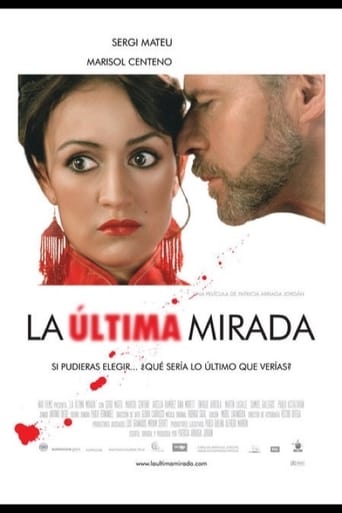

A bit overrated, but still an amazing film
... View MoreAlthough it has its amusing moments, in eneral the plot does not convince.
... View MoreA lot of perfectly good film show their cards early, establish a unique premise and let the audience explore a topic at a leisurely pace, without much in terms of surprise. this film is not one of those films.
... View MoreWhile it is a pity that the story wasn't told with more visual finesse, this is trivial compared to our real-world problems. It takes a good movie to put that into perspective.
... View MoreLets start by saying that this film was written, produced and directed by Patricia Arriaga Jordan, sister of Guillermo Arriaga ( very famous for his scripts of Amores perros, 21 grams and Babel). When I first read about this film I was looking forward to watch it in the cinema but it never got a theatrical release ( or if it did it was very limited) Now, that is such a shame because this movie is in many levels superior to other films that get more attention just because they are nominated for Oscars. This is a simple story in its structure but very complex and deep in character development.Its one of those movies that truly stays with you, every single element of the movie is there for a reason, there is not a single bad scene on the movie. Performances ( specially Marisol Centeno) are real, moving and bi- dimensional).It also has the virtue of not letting you know how its going to end. You think you know, but in the end turns to be something different and absolutely beautiful.In a few words, this is an excellent film, a must see for all the people that says that there are no good Mexican movies. Definitely deserves more recognition. Kudos to everyone for this wonderful film
... View MoreI saw this beautiful film at the Chicago Film festival and I highly, highly recommend it. First off, it is a deeply moving story that revolves around two characters in a small Mexican town: Mei - a young girl who works as a maid in a brothel - and Homero - a painter losing his sight who can only see the color red for a few more weeks before he is about to go completely blind. The story focuses on the contingency and chance crossings of their paths before they actually meet in the final scene, which is ABSOLUTELY brilliant. But more importantly, the movie's exploration of the two characters' subjective, fantasy relations to an impending, terrifying entrapment (blindness and servitude respectively) is unparalleled in Mexican cinema. Second, the movie is visually lush and gorgeous and is a constant delight to watch. But perhaps most importantly, and of special significance to anyone used to watching Mexican cinema over the past decades, Arriaga's movie is, I would say, the ONLY mature Mexican cinematographic inquiry into the relation between art and sexuality I have seen over the past years. It sheds the crass sexual clichés to which Mexican audiences have become accustomed, and takes an honest, compassionate look at the nature of desire - particularly, and uniquely, the growing feminine sexuality of the adolescent Mei as she comes to terms with her own desires, surrounded by a world where sex seems to be some kind of ritualized violence. Besides the many other things that make this film a profound pleasure to watch, for this alone, as a Mexican moviegoer, one gives thanks.
... View MoreI saw this film at the Palm Springs Film Festival last weekend. The story is about accepting change in our personal lives, change that we cannot control. We can either spiral downward while blame others, or we can move forward, accepting the challenges we are faced with. The story follows two main characters; one is an older male, a painter, (Homero) and the other is a young girl (Mei), left behind by her mother. The painter has a difficult time accepting that he is going blind from an inherited condition, while at the same time he is visiting his father in a rest home that is already blind from the same condition. He does everything he can to not let his father know that he is going blind, even so far as to memorize passages of books so he can pretend to read them to his father during their visits. When he is told he only has about one week left to see he decides what "view" would bring him the most happiness and he pursues the task of seeing that view. Mei is a daughter of a prostitute and does not know her father. Her mother leaves her behind and goes across the border. Mei is left in a brothel and works as a maid to pay for the room and board for her and her grandparents. Mei lies to a potential boyfriend about her background but loses him after all because of the lies. While working in the brothel as a maid she is forced into new situations she would not otherwise choose. Homero and Mei's paths cross and the last five minutes of the film are beautiful, provocative and enduring. Both characters finally accept the challenges in their lives and make decisions to stop their emotional downward spiral. This film has renewed my faith in films made in Mexico. The last four I had seen were full of blood and gratuitous violence so I did not have my hopes up very high, I must say I was very pleasantly surprised. I thoroughly enjoyed this film.
... View More